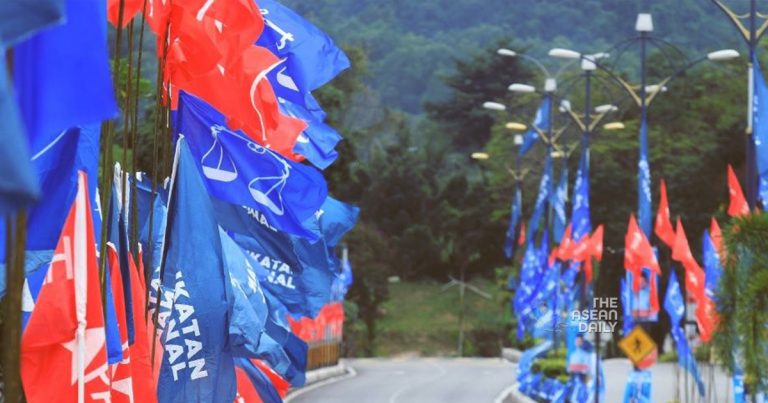12-8-2023 (KUALA LUMPUR) As the countdown begins for the polling day on August 12, up to 9.7 million Malaysians in six states are preparing to exercise their democratic right, casting their votes to elect 245 local legislators. This pivotal electoral event has brought the spotlight onto rival coalitions, each racing against time to sway public sentiment through policy revelations, pledges, and even cautionary messages.
Prime Minister Anwar Ibrahim’s Unity Government and the opposition Perikatan Nasional (PN) coalition have both embarked on a whirlwind of strategies aimed at wooing the electorate. The stakes are high, with the aftermath of this election potentially shaping political credibility, reform agendas, and coalition stability.
A Last-Ditch Effort:
Anwar Ibrahim made a striking announcement on the eve of the polls, unveiling his Unity Government’s intention to boost government salaries. This move seeks to garner support from civil servants and Malaysians from lower income groups. On the other side of the spectrum, PN leader Muhyiddin Yassin vowed to channel Selangor’s state reserves to benefit the public, aiming to secure favour from voters.
These eleventh-hour pronouncements are perceived as attempts to sway undecided voters, employing diverse tactics tailored to resonate with distinct voter segments. Analysts have noted Anwar Ibrahim’s last-minute policy rollouts as akin to “throwing the kitchen sink,” reflecting a push to capture wavering support.
Yet, experts argue that the late-stage initiatives are unlikely to have a decisive influence on voters who have already formed their opinions during the campaign trail.
Navigating the Complex Landscape:
While state polls primarily impact local governance rather than federal policies, their implications are far-reaching. The outcomes of these elections could potentially reshape the political landscape for key figures. A poor electoral result might undermine Anwar Ibrahim’s political standing, his reform agendas, and the stability of the Unity Government. Conversely, PN leader Muhyiddin Yassin’s position within the coalition could come under scrutiny if the election results are unfavourable.
A Spectrum of Initiatives:
Anwar Ibrahim’s campaign efforts culminated in a fervent speech delivered at PH-BN’s rally in Sungai Petani, Kedah. He pledged to implement financial incentives for various sectors, including paddy farmers, rubber tappers, and lower-income Malaysians. These promises, backed by his position as the Prime Minister and Finance Minister, aimed to secure crucial votes by addressing economic concerns and championing social welfare.
Additionally, Anwar Ibrahim unveiled plans to raise workers’ salaries, indicating a commitment to improving living conditions. The Unity Government’s proposed measures aimed at elevating wages and alleviating financial strains on workers further underscored their drive to attract voter support.
Concurrently, the opposition PN coalition, led by Muhyiddin Yassin, orchestrated its own campaign efforts. Muhyiddin challenged the credibility of the Unity Government under Anwar Ibrahim, characterising it as “hopeless” and ineffective in addressing the people’s needs. He spotlighted economic hardships and the rising cost of living, positioning the opposition as an alternative capable of ushering in economic transformation.
The Competition for Selangor:
Amidst these intricate campaign manoeuvres, Selangor emerged as a bellwether state where both coalitions sought to make a mark. Caretaker Selangor Chief Minister Amirudin Shari, leading the PH-BN alliance, pledged to enforce five key measures from the Unity Government’s manifesto within the first 100 days of assuming office. These measures, aimed at benefiting women, homeowners, students, and various sectors, aimed to secure voter loyalty.
On the opposing front, Muhyiddin Yassin rallied in Selangor, projecting a vision of a “supersmart state” with forward-looking planning spanning 15 years. He emphasised PN’s commitment to enhancing Selangor’s development and growth trajectory. Highlighting the incumbent government’s alleged shortcomings, he sought to present PN as a credible alternative capable of steering Selangor towards progress and prosperity.
Challenges in Influencing Voter Sentiment:
Analysts maintain that these eleventh-hour efforts to sway voter sentiment may not yield substantial results. Most voters, having made up their minds during the campaign period, are unlikely to change their preferences based on last-minute pronouncements. Political observers believe that the effectiveness of these strategies may be limited, as voters have already taken their positions.
Professor James Chin from the University of Tasmania views Anwar Ibrahim’s late-stage promises as a concerted attempt to appeal to fence-sitters. This last-ditch effort indicates a degree of uncertainty and the need to secure additional support for the Unity Government. Nevertheless, analysts contend that while Anwar Ibrahim’s charismatic oratory might sway some voters, the majority are unlikely to alter their choices.
An Encumbered Turnout:
Dr Sivamurugan Pandian from Universiti Sains of Malaysia (USM) identifies voter fatigue as a potential challenge in the upcoming polls. The proliferation of character assassinations and other issues has contributed to a sense of weariness among voters. The voter turnout, a pivotal determinant of outcomes, could be influenced by this fatigue. Dr Pandian notes that historical trends suggest lower voter turnout in state polls held separately from federal elections.
BowerGroup Asia Director Asrul Hadi Abdullah Sani highlights the unity government’s attempts to connect with conservative Malay voters through last-minute announcements. These efforts, aimed at addressing issues of significance to this segment, may not be sufficient to alter voting preferences on a significant scale.




